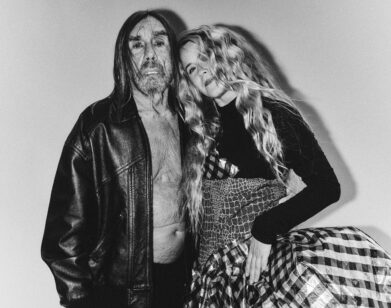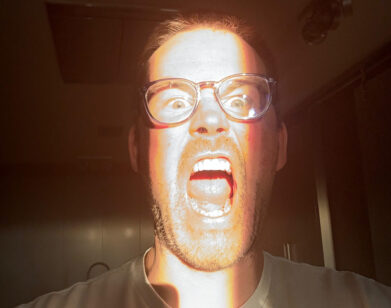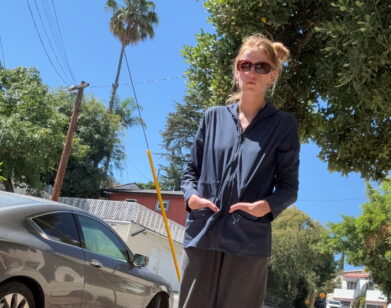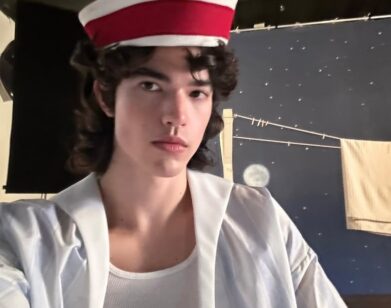King Dude is Not a Barista
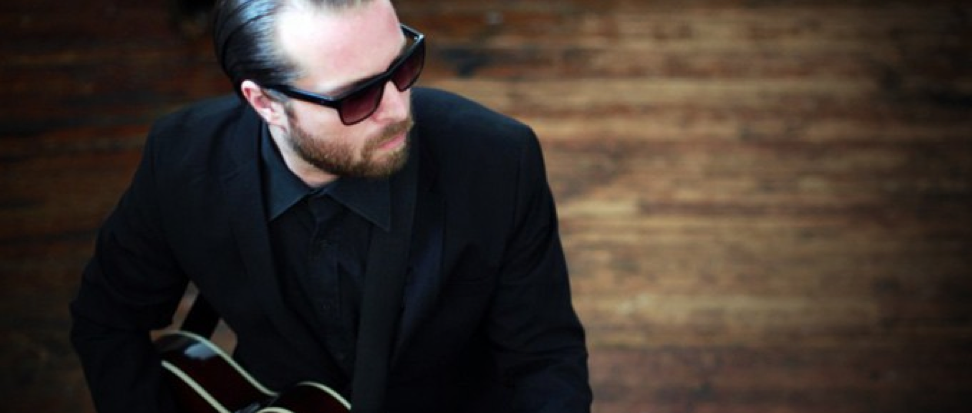
For most people, associations with the occult begin and end with images of Neve Campbell rocking black lipstick in The Craft; but for TJ Cowgill, paganism’s pop-culture façade hides a deep history that’s worth uncovering. As frontman of black metal outfit Book of the Black Earth and proprietor of clothing brand Actual Pain, Cowgill has been repurposing dark iconography and arcane sigilism for years. Now, Cowgill’s folk project King Dude is about to drop Burning Daylight (out tomorrow on Dais Records), and it may be Cowgill’s starkest revelation to date.
Filled with historical inspiration from some of America’s bleakest times, the record plays like a horror-show version of Johnny Cash or Woody Guthrie, where stories about souls sold at the crossroads are more than just folktales. Sung with a baritone that grates like sandpaper, King Dude stitches together scorched-earth imagery (“Satan’s in the cornfield starting fires,” he sings on “Jesus in the Courtyard”), into an apocalyptic tapestry. If that sounds bleak, well, it certainly is, but there’s something devilishly catchy about King Dude’s desolate hymns. Check out our interview below, which might inspire you to draw some pentagrams of your own.
NATHAN REESE: Your music could be called a lot of different things—country, folk, neo-folk, blues, goth, etc. How do you categorize King Dude?
TJ COWGILL: I just like to say folk. Or, like, rock-‘n’-roll. I wear my influences pretty clearly on my sleeve, but people might not know what those are. If I was trying to describe [my music] to someone who did know, I would just say “neo-folk” or something like that.
REESE: Is there a description you’ve read about your music that’s been especially surprising?
COWGILL: One guy thought I was a barista at a coffee shop. [laughs] He got a demo of my album Tonight’s Special Death, which was put out first by an American label and then by an Italian label. He thought I was a confused Italian who didn’t know anything about occultism. Then he found out I was from Seattle, so he assumed I was some barista. I wonder if he ever found out who I am. I just don’t take rock journalism too seriously. It’s rock-‘n’-roll—it’s not the most important thing in the world.
REESE: It would have been funny if more people had caught on to that back story.
COWGILL: I can barely make a pot of coffee! I had a job as a bartender once where I had to use the espresso [machine], and I just could not do it.
REESE: What inspired you to move from black metal to King Dude?
COWGILL: [King Dude] is just a more subdued sound, so I can actually speak to more people. If you really do have a message—and I feel like do—why not get it out further than just the same circle of black metal or heavy metal people that don’t really listen to the lyrics anyway? If someone who doesn’t really think about religion or esoterism hears my music it feels good.
REESE: Have you had any response from the black metal community about King Dude?
COWGILL: It’s kind of surprising how many metal heads really do like it. The label that I’m on in Germany [Ván Records] is one of the biggest metal labels, to me, that does that kind of black metal or occult-based heavy metal, and now they’re putting out my records. I always wanted to be on that label [while I was making black metal], but of course it’s not until I start a folk band that they sign me. A little ironic, I guess.
REESE: The record is undeniably dark, and there are lots of religious themes throughout. Were you influenced by certain texts or stories specifically?
COWGILL: I was actually inspired by a couple of different movies. The Night of the Hunter by Charles Laughton—that inspired a couple songs off the album. A lot of it isn’t directly referential to a book; the record doesn’t come with a reading list. It’s character-based, and it’s fiction.
REESE: Can you talk about some of the historical references?
COWGILL: This record in particular is inspired by The Great Disappointment. It’s what the modern day Seventh-day Adventist Church came out of. The founder of that cult—or that church, whatever you want to call it—was a doomsayer. He convinced them to give up all their money and all their property, which they did because they thought it was the end of the world. When [the apocalypse] didn’t happen, preachers of the church were tarred and feathered. The consequences were higher. I was just interested in that sort of depravity, that disappointment—it’s a horrible thing to do to somebody. When a guy did [the same thing] recently, nothing happened to him, and that sort of pissed me off. I think people should be really mad. I get obsessed with a thought. So the whole record is about depravity, murder, those types of actions.
REESE: Do you see all your projects—your clothing line, your music—as interrelated?
COWGILL: It’s something I used to try to separate. People wouldn’t even know I was in a band when I was making the shirts. No one knew about King Dude. Slowly but surely they’ve come together. I just didn’t think anyone would want to buy a shirt from a guy who makes bizarre folk music, but I realize nobody cares. And they come from the same inspiration, because I’m just deeply interested in that subject matter.
REESE: How did you get into the idea of occultism to begin with?
COWGILL: My dad was a really born-again Christian. When I was six or seven, he showed me this video of Judas Priest, and how all pop music was satanic. It was a Christian propaganda videotape, basically. And I remember thinking “Holy shit, this is fucking great!” [laughs] You know XTC—that video with the guy hammering a tree? I didn’t believe that all music was pushing forward this Satanic agenda or anything, but that there was a way to code music [with other meanings]—I would have never thought about that if he hadn’t shown me that video. That you can seed popular culture with an idea—it’s such a cool idea, and that’s what they were saying Madonna and Prince were doing.
REESE: So pop music really did lead you to the occult.
COWGILL: Yeah, then I just became interested in the origin of religion. I read as much as I could. The origins of Christianity, gnostic texts, how Catholicism was formed. Once I learned about the Cathars, I became sort of obsessed with them. And, yeah —it just helped me work out my issues with religion.
REESE: Would you call yourself religious now?
COWGILL: I think I am. I’m attempting to find out as much I can about the subject. My spirit feels real, and even the music feels very spiritual. I like to think about it as gospel music. When I play a really good show, it feels like we did something important. It’s like we’ve been to church. I don’t belong to any sort of church, but I’ve come to some sort of personal reconciliation with what God or my spirit is. And it feels really good. I think it helps people stay connected to each other. I’ve always felt like a very spiritual person, just not at home in any church.
REESE: What do you think of the more pop culture ideas of goth?
COWGILL: I think that it’s good that there’s a spectrum. I would hate it if it was all really purist, and all talking about the most advanced or esoteric ideas. That’s really boring to me. There’s already bands that do that. Those kinds of bands miss out on the beauty of pop music, and how good it can be. A simple love song is so much better than, like, a complex song about John Dee or something. What I try and do is write both at once, so they have that subtext.
REESE: Have you ever tried to sit down and just write a really happy song?
COWGILL: Well, a lot of them are really happy to me, but I don’t think they reflect that. When I sit down I try to write the happiest song I can, and they just come out the way they do.
BURNING DAYLIGHT IS OUT TOMORROW. FOR MORE ON KING DUDE, VISIT HIS BANDCAMP.


